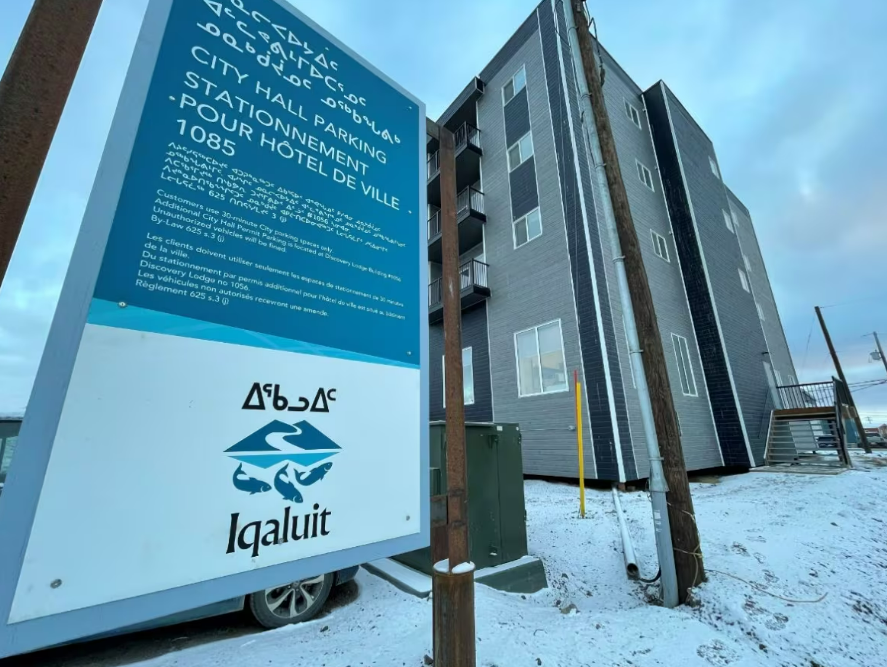Iqaluit churches upset after property tax bylaw leaves them in debt

The City of Iqaluit’s bylaw which requires religious and non-profit organizations to pay property taxes is not sitting well with two of the city’s churches.
In a speech to Iqaluit city council on March 26, John Maurice, the president of the council of Our Lady of Assumption Roman Catholic Church, said the bylaw has created a “crushing financial burden on most religious and charitable institutions in Iqaluit.”
“Many of them will not be able to sustain the payments of these property taxes, not to mention the onerous bureaucratic obligation of filing reports and requesting for leniency,” Maurice said.
“We would venture to guess that most of the institutions will not be able to pay the amount imposed upon them and they will enter into debtor status with the city.”
Maurice told council the church is being asked to pay $38,000 in property taxes for this year.
The city passed a bylaw in 2022 which required religious and non-profit organizations to pay property taxes on non-residential buildings that are used for those purposes.
Under the bylaw, organizations can apply for an exemption from the city.
Another Iqaluit church struggling to pay the fees is St. Jude’s Anglican Cathedral. Despite receiving a 75 per cent exemption from the city for the next four years, they will still be required to pay $29,000 per year for the cathedral building during that time.
With the church in an already poor financial situation, this has made things worse. Chris Dow, rector of St. Jude’s, said the church passed a budget this year with a $190,000 deficit.
“We have increasing costs in any number of areas, including in insurance. Our insurance bill for everything is $100,000; additional $29,000 in property taxes. We have increasing utility costs, as all people do in the North here. We also stepped out in faith to bring in more clergy colleagues.” Dow said.
St. Jude’s will be eligible to re-apply for another exemption in three years.
In an effort to get the city to repeal its bylaw, Our Lady of Assumption has created a petition that has been sent to multiple organizations in the city that are facing similar predicaments.
St. Jude’s was one of them, but Dow said they will not present it to their parishioners just yet.
“The decision to do so would need to be one made by consensus; by our vestry, our church council and our clergy colleagues,” Dow said.

Expert surprised by city bylaw
An urban planning expert says Iqaluit is an outlier in Canada when it comes to charging religious and non-profit organizations with property taxes.
“Those things change from time to time, but to my knowledge, in Canada, that’s unique,” said David Amborski, director of the Centre for Urban Research and Land Development at Toronto Metropolitan University.
Amborski says he’s not surprised to hear the two Iqaluit churches say they can’t afford to pay their taxes.
“Some religious organizations do have assets, but the assets are usually land or something they can’t capitalize into cash flow,” he said. “With the churches being reliant on mostly donations, it’s very difficult to face new budgetary increases like that. It probably represents a significant portion of their annual budget.
“It would be a really big hit compared to what their revenue streams are.”
In a statement, Aleksey Cameron, communications and customer service manager with the city of Iqaluit, declined an interview request, saying an interview would be premature.
“There have been no new developments outside of what is already in the public view,” Cameron said. “Council will be discussing this in the coming months.”
Dow says he’s pleased that council is reviewing the bylaw, saying that he’s in no rush for a decision to be announced.
“It’ll all happen in God’s time,” he said.
Despite being initially worried about how St. Jude’s would pay the bill, Dow says he’s at peace with the situation.
“We will be looked after come what may,” he said. “We have faith and hope.”
TJ Dhir
Related stories from around the North:
Canada: Inuit land claims org mulls law suit against Nunavut over change to tax law for Inuit-owned land, CBC News



